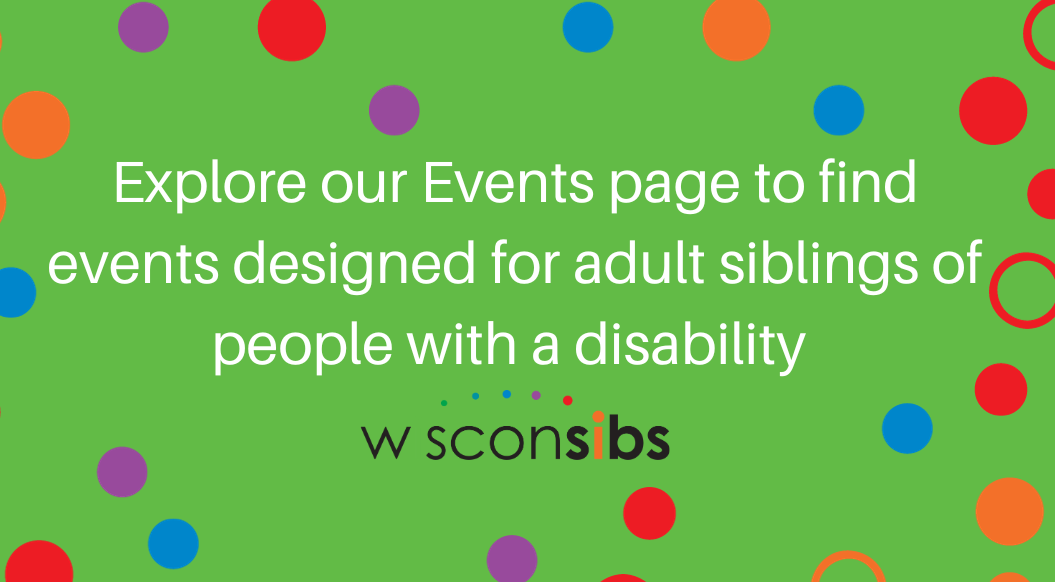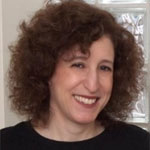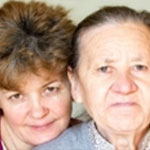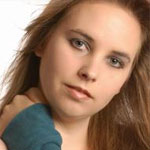Adult Siblings
You’ve probably heard about the “sandwich generation.” That’s the group of adults who are “sandwiched” between providing or overseeing care for their parents, while at the same time caring for their own families and young children. Now, if you add a sibling with a disability to the mix, that group is more of a “club-sandwich generation” – dividing their loyalty among parents, their own children, and the brother or sister with a disability.
More than ever before, adults who have siblings with disabilities are being called upon to coordinate the care of their siblings at the very least, and provide direct care in many cases. People with disabilities are living longer, often outliving their parents. According to the National PLAN Alliance in 2002, more than 65% of adults with mental illness and 81% of adults with developmental disabilities live with their parents, most of whom are already in their 60s, 70s and 80s.
The number of elderly parents caring for their children with disabilities will continue to increase, while social and financial supports continue to decrease. That leaves long waiting lists and gaps in services in most areas. And that adds to the stress adult sibling can face.
That’s where WisconSibs can help. We offer a variety of programs that provide adult siblings the opportunity to meet other adult siblings, connect with information and local resources important to their unique issues, and even provide fun social activities they can enjoy with their brothers and sisters.
Got Questions?
|
 |
Perpetual Lockdown – “I am a sister of an only child” –
In this brief 9-minute story posted November 13, 2020 on BBC Radio – A Point of View – Sara Wheeler reflects on lockdown for her brother – profoundly learning disabled – and others like him. Books, she writes, “teach us that my brother’s isolation and society’s inability to embrace him as he deserves to be embraced have always been with us.” But she wonders if, in these times, books can also teach us to be kind.
https://www.bbc.co.uk/sounds/play/m000p8z0
Stories
 Award-winning author Rachel Simon describes her relationship with her sister, Beth, who has a developmental disability.
Award-winning author Rachel Simon describes her relationship with her sister, Beth, who has a developmental disability.
“She is my sister, and I remember tossing grass cuttings under the house with her when we were little, and singing about ‘The Impossible Dream’ in the car with her when she was learning to name tunes. I remember the tearful ride home from La Guardia. I’ve always figured there must be some grief in her heart, but I don’t see the things that she censors. What she must censor, I correct myself, as we all do when we grow up and make ourselves distinct from our families. I love her, and at last I believe that she loves me too, but I know that in her eyes I will always be the big sister. It is both my bridge to her, and the moat eternally between us.”
From Riding the Bus with My Sister by Rachel Simon.
The following is a true story with names changed to protect privacy.
 Samantha is 51 years old. Her older sister with cerebral palsy still lives with her parents, now in their 80s.
Samantha is 51 years old. Her older sister with cerebral palsy still lives with her parents, now in their 80s.
Samantha is frustrated, angry and resentful. She wants her parents to discuss a plan for the care of her sister, but she is reluctant to bring up the topic for fear it will upset her parents.
As Samantha grew up, she was expected to help care for and entertain her sister. As she recalls her childhood, she felt the isolation, embarrassment and fear of disappointing her parents that many siblings feel as they grow up. She loves her sister and the two have always had a very close relationship. But her parents have left Samantha out of discussions about the future care of her sister. Samantha realizes that perhaps they feel this would protect her, but she feels hurt.
Now that her parents are elderly, it is an unspoken assumption that Samantha will take over as primary care giver. But without a plan and honest discussion with her parents, she feels inadequately equipped and fearful of the future.
 Actress Eva Longoria, talks about her sister with special needs. See her video interview.
Actress Eva Longoria, talks about her sister with special needs. See her video interview.
Welcome to Our World
In the United States, over 5 million people have assumed – or expect to assume – responsibility for a dependent sibling, and that number is growing as baby boomers age.
 With that many siblings becoming more involved as “natural supports” for their brothers and sisters, there is a greater and greater need to get involved in planning for the future – their own and their sibling’s. As Wisconsin sibling Ashley Baldwin stated in her interview with the Appleton Post-Crescent, “[As siblings,] it’s our biggest worry. What are we going to do about our siblings’ future? And how do we make sure we do the best thing for them?”
With that many siblings becoming more involved as “natural supports” for their brothers and sisters, there is a greater and greater need to get involved in planning for the future – their own and their sibling’s. As Wisconsin sibling Ashley Baldwin stated in her interview with the Appleton Post-Crescent, “[As siblings,] it’s our biggest worry. What are we going to do about our siblings’ future? And how do we make sure we do the best thing for them?”
Ashley credits WisconSibs’ Journey Forward program (formerly called Future is Now) for getting the information and the encouragement she needed to get her parents and her sister, Katie, moving forward in making the connections and the decisions to ensure Katie would lead a life of dignity and happiness.
Here’s how another adult sibling recently described her situation:
“Now that my kids have almost flown out of the nest, I realize that I need to seek support for the next phase of life which consists of helping elderly parents and sibling care issues. I think this phase of life is harder. With my kids, I had the authority to make decisions in directing their care and growth. With my sibling, I have absolutely no authority, but I will face all of the consequences of my parents’ decisions. I feel like my role is to just be ready to mop up the mess that results from parental decisions that were based on their refusal to work with me or see the reality of the situation.” Email message from adult sibling, May 2012.
Tips for Adult Siblings
- When you feel that others do not understand your situation, talk to other siblings. Join a sibling support group or SibNet, a listserv group available. Find a book about the experiences of siblings, like Special Siblings – Growing Up with Someone with a Disability, by Mary McHugh or one of several books listed in Books and Resources.
- You feel you have missed out on something as a child. It is OK for you to lead a life of your own and still be a part of your family. Many siblings feel guilty about being talented in some way. Allow yourself to enjoy your talents, as this will improve how you feel about yourself. Celebrate your achievements, however small you think they are. Ask yourself ‘What have I achieved this week?’ and give yourself a reward for these. Do those things now that you wished you could have done as a child! For example camping, playing drums, spreading all your stuff over the kitchen floor, having friends stay at your house.
- Sometimes you feel that your brother or sister with a disability is still the focus of attention in your family and you feel resentful. This is normal even though you may think this is not a very ‘adult’ way to feel. Make an opportunity to talk to your parent about what it was like for you in childhood. Ask him/her if they ever wondered about your experience of being a sibling. Tell him/her about the benefits of being a sibling as well as the difficult things. Ask your parent if you can have some of their undivided time for something special for you: going out together, helping to decorate a room, playing with your children, going shopping, etc.
- You are unsure about the genetic implications for you (or your children) of your brother’s or sister’s condition. Find out more about your brother or sister’s condition. There is more medical information available now than when you were a child. Discuss with your parents or medical professionals, or search the internet.